Why Do Home Ponds Need All This Technology? Natural Ponds Don't
Greetings from Southern California!
I am new to pond culture, but have maintained small, indoor aquariums in the past.
We have an oval-shaped pool in our backyard that is about 10-12' deep at the deepest part, and 4' deep at the shallowest part. We'd like to stop adding chlorine to the water, and then eventually stock it with edible fish.
I've been reading a lot about providing moving water, aerating pumps, filters, vacuums and other technological inputs. Why do we need to use these things? Natural ponds have plenty of healthy, edible fish in them without needing any technology whatsoever.
Do I just need to plant more aquatic plants, and use niche animals such as detritivore crayfish, bottom-dwelling catfish, algae eating fish, snails, snail-eating fish, etc?
Comments (32)
curb1
13 years agolast modified: 9 years agoThere are many "natural ponds" the size you are talking about that can't support any kind of fish. Oxygen is important. A healthy natural ecosystem is more complex than the technology we use for our ponds.
catherinet
13 years agolast modified: 9 years agoYes, natural ponds are alot more ecologically complex than our kind of ponds.
But I would say that plants are really important......all kinds of water plants.
Even in my small stocktank ponds, when the plants get growing, the water really clears up.
Having fish in a pond really changes things though. I think you'll just have to do a trial and error thing. But oxygen is the name of the game.Related Professionals
Beachwood Landscape Architects & Landscape Designers · Hershey Landscape Architects & Landscape Designers · Hyattsville Landscape Architects & Landscape Designers · South Orange Landscape Architects & Landscape Designers · Willowick Landscape Architects & Landscape Designers · Zion Landscape Architects & Landscape Designers · Maple Valley Landscape Contractors · Alpharetta Landscape Contractors · Brunswick Landscape Contractors · Dixon Landscape Contractors · Florham Park Landscape Contractors · Milton Landscape Contractors · Richmond Landscape Contractors · South Portland Landscape Contractors · Watertown Landscape Contractorsterrestrial_man
13 years agolast modified: 9 years agoThe real issue is the carrying capacity of your pond.
Inset the terms "carrying capacity of a pond" into a search engine and follow what links interest you.
The use of aerators and flowing water help to increase the load that the pond can handle.
On stocking for food fish in California you will need to check with the DFG
http://www.dfg.ca.gov/
There are licensing requirements and some restrictions.
Also you may need to check with your local Health Department on any possible requirements and regulations.
If you want to use the fish as a primary source of meat then you will need to have some of the filtration, aeration, etc. as you will be growing them in a much more intensive environment than a natural pond where there is a balance of natural processes and only a limited number of fish which are tied into a food chain with the larger predatory fish at the top.
Google natural ponds for more info.sdavis
13 years agolast modified: 9 years agoThere's big bucks in pushing landscaping, labor, unnecessary pumps, fittings, chemicals to the pond market, commercial interests perceive it to be a very profitable market for folk with money to burn
Pond keeping can be a lot more pleasant and less expensive than that
Fish keeping for edible fish might be a challenge on a small pond, the requirements for oxygen would involve air pumps and some knowledge of what fish can cope with your climate
Natural ponds tend to have low fish densities, abundant natural resources, folk who know how to do it...
insipidtoast
Original Author13 years agolast modified: 9 years agoIt's a booming industry. I figure a lot of people buy into the paradigm that's been sold to them.
People have been doing "no-tech" aquariums for a long time, so why not a "no-tech" pond?
sleeplessinftwayne
13 years agolast modified: 9 years agoThe main reason for all the filters and pumps is because a man made pond or water garden is a lot different than a natural pond. An artificial pond is self contained. It does not have an outside source of fresh, healthy, oxygen rich water coming in the way a natural pond does. Natural ponds work mainly due to gravity. Our ponds do not.
There is an old saying that you cannot step in the same river twice. That is because the water is continuously replaced by rain and streams. The water is always new. In our ponds we are stepping in the same water all the time because we are using the same water over and over. If there is no circulation or addition of oxygen, the water and what it supports, dies. Then you have a stinking mess.
terrestrial_man
13 years agolast modified: 9 years agoActually you do not need pumps or water fountains or water falls or even filtration for a man made pond to work effectively. Have done it years ago but I did hose down the surface of one pool that drained into another pool. Yet in any body of water there is distinct differences between the surface temps and the bottom temps and this in itself can cause convection of the water caused by the rising of water that is being heated and the fall of water that is cooler than the water that is heated.
Check the link below to a very interesting article that is focused upon raising catfish.Here is a link that might be useful: Natural Cooling and Circulation of Water in Ponds
evesta
13 years agolast modified: 9 years agoI also keep aquariums, fancy goldfish aquariums and I think I have more fancy filters on my aquariums than my pond! Much harder to keep small water amounts happy for fish than large bodies of water.
But natural ponds and liner bottom ponds are not the same thing. Mud bottom ponds are self cleaning because of the earth bottom although many still can't support fish because of low oxygen and other issues. Mass fish die offs in nature are very common coming out of winter actually because of low oxygen. I don't think you need a lot of fancy things but a pump and and a diy filter are a must especially if you are going to have a high fish load.
I also think bottom drains are a must otherwise you have a pond toilet you can't flush although aquariums can't be flushed but need to have water changes regularly. You can get a bottom drain for around $50 and because I've had one I don't have to use chemicals to "clean" my pond or muck it out once a year. Just a weekly flush during water changes.
Can you just have a hole in the ground or stock tank and have it work as a pond with plants and fish? Yep but you have to be careful about the balance of things, ratio to fish and plants and oxygen. Plus a pump because stagnant water breeds mosquitos and in the heat you can lose fish to lack of oxygen. I have a natural stock tank but still have a pump and do an occasional water change to keep things healthy.
jayinflorida
13 years agolast modified: 9 years agoI've been doing the pond thing for over 20 yrs... never had any filters or running water and have always had healthy, full of life ponds with crystal clear water. Like other have mentioned, you don't want to over populate your pond... knowing that and having the right plants is a big factor. If you just put a bunch of fish into a pool then you're probably going to have issues because you have to have everything balanced out just right.
hoovb zone 9 sunset 23
12 years agolast modified: 9 years agoThere are several reasons.
Natural ponds have water running in and out of them constantly.
They are usually also a lot larger than most backyard ponds--tens or hundreds of thousands of gallons of water instead of 500 or 5000 gallons. Water volume matters.
Home ponds are often more overstocked with fish than "natural" ponds.
Time is an issue. Over decades, a balance of plants and animals develops in a "natural" pond. A home pond only a few years old has not had time to balance out.
buyorsell888
12 years agolast modified: 9 years agoYou don't actually have to have all the technology. I've had a clear goldfish pond since 1996 with a simple DIY filter and a ton of plants.
I have over ten smaller ponds for plants and wildlife with no pumps, filters etc.
The only one that gets a yearly total clean out is the greenhouse pond. It is so hot in there that it grows big globs of algae if I don't keep the water tinted black.
I don't use chemicals in any of them.
contraryjim
12 years agolast modified: 9 years agoWhen I started my ponds ( one small &one large) I tested daily at first, everything was right on, I kept reading here on the forum of water problems and die offs but eventually testing was weekly, then monthly and I haven't tested now for several years. Both ponds are filtered, neither has been cleaned, water is added if the rain hasn't balanced evaporation. The raccoons have killed all but the marsh merigolds and the now illegal under water oxygen generating plants. At least at this point in time, I'm low tech. My feeder gold fish have thrived now being over 6 or 8" long and new fry come every year. Dam m raccoons.
buyorsell888
12 years agolast modified: 9 years agoJim, I have an electric fence around my goldfish pond and chicken wire covers over my mini lily ponds in front. DH used copper tubing from big box store and bamboo poles from garden center to create the fence instead of the plastic posts and wires that come with the Fido Shock fence. Works like a charm and doesn't look too hideous. Raccoons still devastate my smaller container ponds but I can live with that...
I haven't had a water test kit in a decade....
mike_il
12 years agolast modified: 9 years agoWhat information that you have gotten here is correct. Yes your swimming pool has some water volume to it. I would think we would be talking tens of thousands of gallons. But I don't think you could find a natural pond that has no outside source for new water that would be this size and have fish in it. Nature would fill a pond this size so that it is a swamp or marsh or it would have water in it some times and some times not. But lets say that you could find one that did have some fish in it. There would be nothing but some very small fish nothing that would be edible. Without that source of fresh water it could not support much fish life. The next thing would be that nature would not put extra food into the pond like you are going to have to in order to have fish large enough to eat. Nature wouldn't care if the fish didn't have enough food to grow or live. There would just be the natural food that this size pond could support. You are not wanting a natural pond but a man supported pond that doesn't need anything. You have said that you have had indoor aquariums in the past. My question is in these aquariums have you ever had just the container with water and fish and never done anything to help the fish? I would guess not. At the least I would guess that some water changes have been done. Most outdoor garden ponds are more like aquariums than natural ponds. The big difference between the two is that nature in most areas is supplying some rain for water changes.
Mikekansaskonza
12 years agolast modified: 9 years agoWith a depression in the earth of any size that can hold rain water, comes birds in search of water to drink and bathe in. On their feet are fish eggs from other ponds they have visited. These eggs get deposited in other ponds they visit. This is how farm ponds often get fish if they are not stocked. Fish eat algae in any size pond or containment system. Light grows algae. It's the life cycle at it's simplest and I am sure I am leaving out many other factors. But you don't have to test, you don't even have to feed the fish. Nature provides mosquito larvae and other insects to feed on along with the algae. There is nothing to say you can't have all the bells and whistles in ponding if it makes you feel better or enjoy it more but you can have just as beautiful of a pond without. I have a liner pond, a sunken tub pond and hand dug clay pond. I love them all and they each bring immense joy. But to say ponds can only be done one way and one way only is a very narrow view of something that makes our lives so enjoyable and brings so much sustainability to our backyards. Go dig a hole...let it fill with water and life....Or take an already dug hole and let it fill with life....
rlv4
12 years agolast modified: 9 years agoI second, third or whatever the count is, the notion that people get way too caught up in the technology when creating waterfalls and ponds. I've been building waterfalls and ponds for over 15 years, many of them I maintain for my customers. ALL of them consist of nothing more than a pump to move the water through some ort of natural filtration system. This is nothing more than a bog or stream filled with plants. I've never used any type of techology designed to clarify the water. Mother nature has a perfect design, and all you need to do is emulate what she has designed for us.
Here is a link that might be useful: Waterfalls and ponds built in Prescott, AZ
waterbug_guy
12 years agolast modified: 9 years agoAn old thread but worth being brought back. I've read several thousand posts on various water gardening forums over many years and the concept of water gardens not requiring filters and pumps is rare. Most posters seem to just repeat what they've heard.
So I'll add to the opinion that filters and pumps aren't required on every pond. Size of the water has nothing to do with it. Smallest pond I kept was 30 gal 12" deep, no filter or pump. Clear and easy to keep.
There is no difference between a "natural pond" and a liner pond. A chemist or biologist would be able to tell samples from both apart. None of the creatures living in a liner pond have any idea there's a liner or care.
Wish there was a forum devoted to the subject of pragmatic water gardening. Could that be possible here on GardenWeb? Myths take up most of the space on current water gardening forums and that gets old.
albert_135 39.17°N 119.76°W 4695ft.
12 years agolast modified: 9 years agowaterbug_guy I would conjecture that it would be difficult to run a forum on ''pragmatic'' anything. Persons on forums, now and for as long as I have been lurking, of all sorts, like to copy and paste or indulge themselves in what I call ''recitation''. The pond persons here are as good as we are going to find, I suspect. The pond persons here are better than some regulars on some other gardenweb forums.
sleeplessinftwayne
12 years agolast modified: 9 years agoThe thing that is best about this forum is that not everyone takes the same line. You can put out any theory you wish but if your advice is faulty, people stop paying attention to you.
I've been participating in this forum for ten years now from the first 100 gallon test pond when I knew absolutely nothing about ponding, to my present 1000+ gallon pond and I am still learning. I have tried suggestions from many different ponders. The ones I trust are the ones who gave me good advice. Many of those are not posting now because they got tired of giving the same answers over and over and getting dissed by those who were determined to advance their own ideas over experience and commonsense. We are going through a period now where the majority of posters are newbies so there are some ideas being floated that are not going to work out. Once they discover that simple fact they will either adopt the better ideas or they will simply lose interest and disappear from the forum.
Believe it or not, most of the "new" ideas and methods being proposed have been discussed repeatedly here. Sadly very few seem to look at the FAQ section which covers the important points or do a search to see the many discussions on just about every topic you may need, including the topic at hand which might have been started from just such a search since it is a year old.
The point is, what do you want in a pond, how much work are you willing to do and how much money are you willing to spend? There are certain things that must be done if you want to achieve your goal. Only you can decide what that goal is and how much you are willing to put into it. Lots of high tech filtering devices come onto the market and are only around for a short time before they are replaced by more high tech filters. Some low tech devices do the job and have been around for many, many years. The high tech filters may or may not do the job more efficiently but the cost will always be higher than the low tech. If you have the money to spend, that is your prerogative. In the end, they are both doing the same thing: filtering gunk from the water, controlling algae, making the water healthy and clear, controlling mosquitoes and keeping your fishies happy.
waterbug_guy
12 years agolast modified: 9 years agoA person can hope...put yeah, after years in forums I know it's a pipe dream. I think it's just the nature of the hobby. When a Koi pond owner spends thousands on fish, has a heavy fish load on day one, feeds pounds of food per week, they really have to get it right or all the fish die pretty fast. So there's a lot of interest in understanding systems just because it's a requirement to keeping fish alive.
Water gardens are pretty hard to get complete failure. Filters aren't really needed so there's really no harm in adding whatever gizmo people like. It's OK to think adding plants starve algae, because ponds clear on their own most of the time and so no real harm in thinking the plants were the cure.
I just always thought it would be interesting to see what direction water gardens would take if there ever was some serious understanding of the hobby like is seen in Koi ponds, orchids, etc. But there's really no need for that in water gardens.
The only downside is the number of water gardens that get filled in every year because they tried a dozen myths to fix a problem and none worked. That's a shame because I think water gardens are a great benefit to wildlife in the area.
sleeplessinftwayne
12 years agolast modified: 9 years agoWaterbug guy, the problem is that not everyone can have or wants a koi pond and you can't settle. There are always people on this forum and many others who understand the hobby and who are successful at it. It just isn't YOUR ideal pond. No two ponds are ever exactly alike.
Koi ponds are great but there are drawbacks. Koi can be very, very expensive. Koi grow to be big fish. They require a lot of water and a lot of space. That in turn requires a lot of money if you want the fish to be healthy. Not every one who enjoys ponding can afford the cost of or has the space for a Koi pond. My wants are dictated by the size of my purse.That is the essence of pragmatic.
I would like to hear your definition of "pragmatic". I don't think it matches mine or the dictionary's definition. DIY is pragmatic. This forum is nothing but pragmatic. Tech is anything but pragmatic.
Don't get me wrong, I love Tech. I sold and repaired computers for a living. I did systems analysis. I even built a few for special circumstances. I am fascinated by systems and how they work. (It's called synergistics.) That is the essence of Tech. Funny thing though, the basis of Tech is always DIY. Tech grows out of someone looking to make things faster, more efficient with less human interaction but sometimes Tech is simply throwing money at a problem or situation. If I was building ponds to make a profit, I would definitely push as much Tech as possible but I don't and this forum is not exclusively for pond contractors and salesmen, although we have a few. They are very helpful when it comes to comparison of different elements of a system but there are plenty of other forums for the professional.
Many of the people who come to this forum are newbies. Some know a lot already, some don't. If they wanted only the latest Tech, they would get a contractor and someone to do the maintenance and their pond would be like a dozen others. But usually our newbies want to understand how and why a pond system works even if they don't know it at first. Telling them they can only succeed with the latest Tech is just not true. This forum gives them choices that work and tells them what doesn't work in their situation if we can. (Not everyone listens.)Sometimes that is DIY, not Tech.
waterbug_guy
12 years agolast modified: 9 years agoSleepless, I don't much like Koi ponds, never kept one, don't want to keep one. Don't know what you're talking about. Who said Tech was pragmatic?
Things that are not pragmatic:
1. Plants starve algae.
2. Concrete raises pH and kills fish.
3. Ponds have to be heated in winter.
4. Shelves invite predators.
5. Skippy filters cure green water.
6. Submerged media is a good filter.
7. Moving water stops mosquitoes.
8. Roof EPDM is toxic.
Dozens more examples. Water garden forums are full of them.These are dogmatic.
DIY is not pragmatic. It can be, or it can just be people repeating myths with no interest in understand if something works or how it works. Simply making up stuff because it sounds right is not pragmatic...it's dogmatic. If anyone even darns to question dogma they're flamed.
People want to believe they're pragmatic, and they want to sound like experts to unsuspecting newbies. They want the appearance of knowledge without any effort.
mike_il
12 years agolast modified: 9 years agoWaterbug guy,
Are you saying that your list of 8 items are all myths?Mike
sleeplessinftwayne
12 years agolast modified: 9 years agoThe things on that list have sparked a lot of discussions with lots of pro and con. Some people will always continue to believe the "myths" because it fits their mindset. They just cannot be convinced. They want to argue more than learn or to solve a problem. That's alright, they usually go on to another hobby. The sad thing is they are sometimes able to convince others to follow bad advice.
If discussions of all ideas and questions were not allowed, this forum would have no reason to exist. Ponders on this forum will give reasons and suggest sources to back up their experience IF IT IS WARRANTED. Sometimes too much info at one time is simply more confusing to a person who is faced with multiple choices without any background to make a decision. Additional info can always be given as needed.
Every example you mention has been discussed repeatedly because the question has been raised, usually by a newbie. It would save a lot of time and space if everyone used the search function before posting especially when the topic has been discussed several times on the same screen, but that probably isn't going to happen. It's too easy to ask a question rather than spend an hour or two reading say 233 threads that mention the subject. However, it is ridiculous to spend the time to type the same response time after time when cut and paste as well as links are possible to achieve the same ends. Aren't computers wonderful?
Some questions come up so seldom that they have disappeared from the currently available record so it is logical they should be discussed again if they are important. "Wayback" only goes so far.
You still haven't given me your definition of pragmatic. Your list of things you say are pragmatic don't have anything to do with being pragmatic. They are just incorrect or incomplete data.
Your claim that some people here just want to be seen as experts is kind of silly. Some posters are undeniably expert in at least one and often many aspects of ponding. Strangely enough, those I regard as experts have never made that claim. Call me a cynic but when I hear someone tout their own expertise, I have a lot of doubts. When you are consistently correct, other people are happy to make that claim for you.
waterbug_guy
12 years agolast modified: 9 years agoPragmatic is clearly defined in many dictionaries. I think your issue is not with my definition but my use. I'll try one last time before the horse is completely dead.
"I put a Coke can in my green pond and 3 weeks later it cleared." That is not pragmatic imo. It is theoretical. If the poster would be open to discussion and experiments it would become pragmatic no matter the results. But that, for the most part, does not happen in all the water garden forums imo.
For example, I've posted maybe a couple of dozen times to threads claiming plants cleared green water by starving the algae asking for the poster to get a simple water test to see the level of nitrogen and phosphorus which imo would prove this a myth. I've never had any takers. Time enough for 100's of posts making the claim. That's dogma.
Same goes for many other myths. I must have made 100 posts on the subject of concrete, a myth I once believed. Simple test...no one and I mean no one ever bothered. Or if they did they sure didn't post the results.
So yeah, I'd love a forum for pragmatic water gardening. A bunch of people all measuring nitrogen and phosphorus levels to see what's really going on in green and clear ponds. Subjects unique to water gardens. Can't really have that kind of discussion in a fish farming or high end Koi forum because they use UV and no plants.
But like I said, I don't think there's any great need or desire to understand water gardens.
Debbie Downer
12 years agolast modified: 9 years agoA simple answer to the OP's question:
There are two kinds of natural ponds. One is well oxygenated with a regular flow of water in and out of it - maybe a spring is feeding it. The other is just a stagnant pool of standing water - maybe snow melt or rain collecting in a low spot.
You are welcome to have the second kind if you want, but it wouldnt be very pleasant! Stagnant water smells, breeds mosquitos, and mostly does not provide good habitat for fish. To artificially recreate the first type of pond most people use some sort of artificial pump and filtration.
That said, it doesn't need to be anything very elaborate or expensive at all. In fact, I had a tiny temporary pond once with no pump but I would every couple of days siphon out sludgy water and replace with fresh water. The principal was the same as a spring fed pond - ie moving out the stagnant water and bringing in fresh.
Bottom line is - you gotta do that, one way or another - high tech or low tech or no tech - or you get sludgy smelly mosquito infested green pea soup!
mike_il
12 years agolast modified: 9 years agoWaterbug guy,
First I will talk a little bit about concrete in water. You say it is a myth that concrete in water can kill fish and raise the PH. When concrete first sets up the surface PH is 12.0. Which is the same PH as a drain cleaner called "draino". As it is exposed to the CO2 in the air the PH goes down. But water is a very good leaching agent and so water will continue to try and get the chemicals out of the concrete. So will the PH in the water be raised? If the water has normal PH of 6.5 to 8.5 the answer is yes. The real question should be "how much will it raise it"? That question isn't easily answered as there are a lot of variables. Just to list some the age of the concrete, the condition of the concrete, is the water flowing over the concrete, the natural PH of the water, is the water being changed, and the volume of the water versus the contact area of the concrete. In some cases the rise might be so low as to make it very difficult to measure. But in other cases it can and does raise the PH to 9 to 9.5. At these levels it can and does kill fish.
If I remember correctly you have stated that you are a pond contractor. If you are I hope you having started using roofing liner in the ponds that you build. Most of the time a person on this forum is never going to have a problem with roofing liner. Can there be a problem with roofing liner? This should be the question. The answer is yes. The chances that there could be a problem is very low. The largest pond product manufacturer in the US sent out a letter to all their customers a number of years ago. This letter said that all their liner in the future would be tested to be fish safe as they got a batch in that was not. In other words they were selling roofing liner as pond liner. This company had been selling a lot of liner for 10 years before this problem. If it had happen today with the wide use of the internet I would have think that some lawyer would have gotten this information and started a class action lawsuit against them and they would be out of business. The lawyer could easily have sued them not only for the cost of the liner that they had sold but for the cost to replace all those liners in the ponds built with them going back to the first time they sold this liner. The largest liner manufacturer in this country has told me that almost never would you ever have a problem with roofing liner but you might. I think that as a contractor you can't take that chance. If you were unlucky and did have a problem and were sued over that problem the lawyer handling the case would find out that they would sue for every customer that you have that has this liner. In other words you would be out of business. So is roofing liner toxic? No most of the time. But there is a small chance that there maybe a problem.
I have only talked about 2 of the 8 things that you listed. I could easily talk about many of the other things listed but my point is this. You listed these things as black and white but they are not black and white. The only thing that is black and white about ponds is that all aquatic life will die.
Mikewaterbug_guy
12 years agolast modified: 9 years agokashka_kat, first pond I ever had was a low spot pond with no movement. It was "just a stagnant pool of standing water" as you put it. You are entitled to your opinion that "it wouldnt be very pleasant". I on the other hand enjoyed it immensely.
Your claim that "stagnant water smells" is true. It does indeed have an odor. I assume you consider the odor to be bad, I don't. Water in backyard ponds also has an odor, the exact same odor. Maybe you're talking about the odor of the muck?
Mosquitoes breed in both "stagnant" ponds and ponds with pumps unless the pond is small and has a huge pump. Most water gardens with pumps are not "moving" or "flowing". In both ponds fish eat the mosquitoes.
"stagnant" ponds "mostly does not provide good habitat for fish"??? So you don't know that virtually all Goldfish and Koi are grown in "stagnant" ponds? Or that virtually all freshwater fish farms use "stagnant" ponds?
Excellent example of dogma vs pragmatic. No interest in facts or learning, only about pushing myths as fact.
Mike,
Many years ago I tired of answering the cement myth thing so here's my page on the subject.Cement myth. There has been many concrete sewage pipe studies done on the subject."9 to 9.5...At these levels it can and does kill fish." Thousands of ponds are in that range. above 9.5 or 10 are generally considered undesirable in aquaculture ponds There is an issue with ammonia and high pH but 9 to 9.5 certainly doesn't cause death.
Ever read how Firestone deemed their The Pond Safe liner fish safe? They put 6 goldfish into a liner pond for 2 weeks. All the fish lived so it was deemed fish safe. By the exact same test roof liner is "fish safe". I can't give you a link to the Firestone data because they removed it years ago. Hundreds of ponds have used roof EPDM and fish have not died at any greater number than any other pond. I've never even seen fish safe liner marked as such. No chance lots of businesses selling roof EPDM as fish safe is there? No, businesses would never do that.
Few things in the world are black and white. Even the colors black and white can be debated to not be black and white. I'm really not that interested in people's opinions when based on marketing materials, or what they heard from someone else in some forum, or based on home grown gut thinking. It's just one big long waste of time. I like experiments, and data, even empirical data since the full scientific method would be difficult. But this business of just making up stuff because it sounds good...just isn't my cup of tea. Waste of time. But you're certainly welcome to it.
swvirginia
12 years agolast modified: 9 years ago*Loving* this forum.
Keep it up.
I am learning a lot & enjoying the friendly (?) debates from all!
Many thanks! :)
waterbug_guy
12 years agolast modified: 9 years agoThe roof EPDM myth has been popping up a lot recently in different water garden forums so I pulled together what I've learned over the years into a web page EPDM - Fish Safe vs Roofing Liner. It includes a link to the "fish safe" test Anjon did which is nearly the same as the Firestone test.
I know facts will never stop myths but some readers may still have an open mind.
Sherwood Botsford (z3, Alberta)
10 years agolast modified: 9 years agoNatural ponds have troubles too. Generally the larger the pond, the more stable the environment it creates.
I created a pond, about 1/3 acre in size with a volume of about 2000 cubic yards. The deep spot is 14 feet. Within two years it had a thriving population of boreal frogs, chorus frogs, a zillion kinds of small things with more than 4 legs.
This pond has flow through from March through July, then has no additional water, barring an exceptional rain for the rest of the year.
In year 4, there was heavy dirt runoff from work done on the oil well (no I don't get the money, just the headaches) The result of that was an influx of nutrients that caused an algae bloom, and a duckweed bloom. Next spring the frog population crashed from the oxygen depletion of all that rotting veg.
I convinced the oil company to pay for an aerator. Took two years to catch up. Now it runs clear except during spring run off, when bottom feeder ducks visit, or I get a wandering beaver or muskrat.
A shallow pond has MUCH greater temperature fluctuations. There is less water to heat. A fish hobbyists pond has more fish in it per gallon than a natural pond. E.g. My 2000 cubic meter (500000 gal) pond might support 150 8" bluegill. Keeping trout would be marginal. Even 14 feet deep, it has enough shallow margins that the temps may get too high for trout.
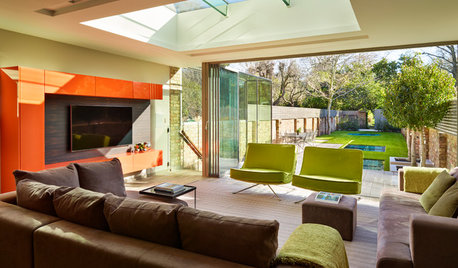
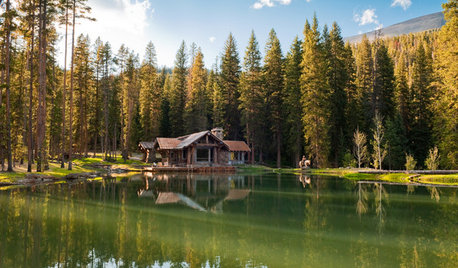
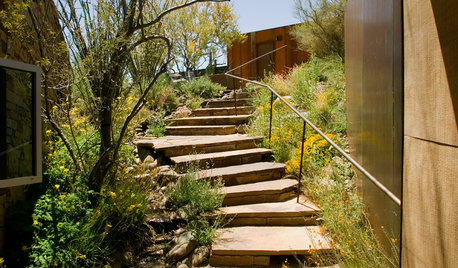
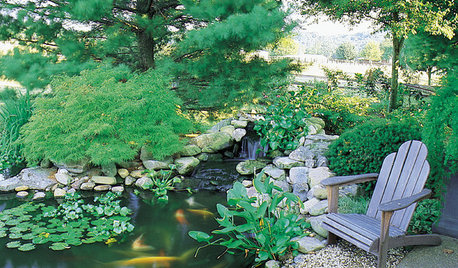
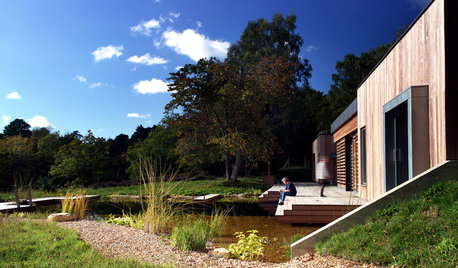
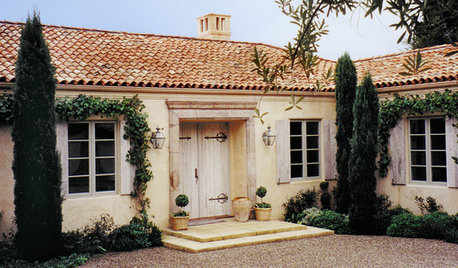
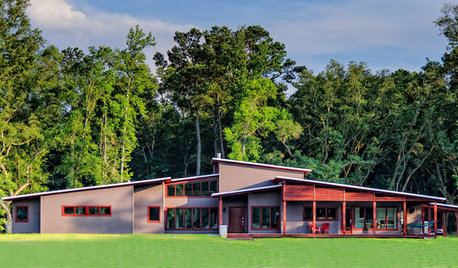
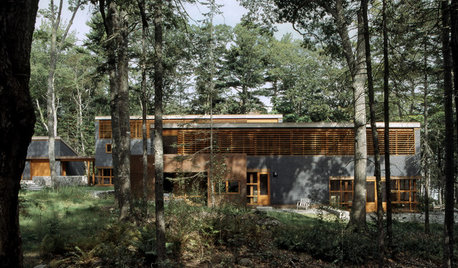
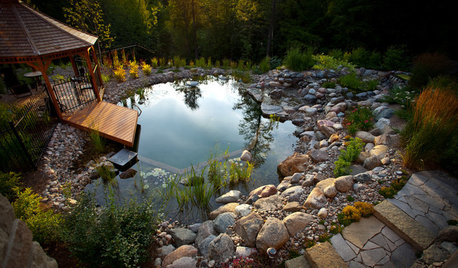
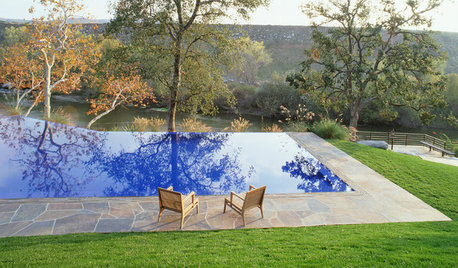






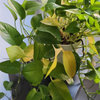
kansaskonza